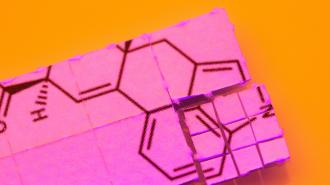Biopharma startup MindMed, along with collaborators at Switzerland’s University Hospital Basel and the University Hospital of Psychiatry, has announced top line data from a phase 2 trial testing LSD as a treatment for major depressive disorder. The results are encouraging.
The trial found that LSD had “significant, rapid, durable, and beneficial” effects on major depressive disorder (MDD), reducing depression symptoms compared to a control group.
“We are extremely encouraged by the results we presented today, which demonstrate the strong, rapid and enduring improvements of this compound in patients suffering from MDD,” co-primary investigator Matthias Liechti of University Hospital Basel (UHB) said in a statement.
MindMed, along with Swiss collaborators, has announced top line data from a phase 2 trial testing LSD as a treatment for major depressive disorder (MDD).
Acid trip (to the lab): As GEN pointed out, the trial results were announced a few days before the April 19 observation of “bicycle day,” commemorating Albert Hofmann’s famous bicycle trip home from his lab after ingesting LSD on purpose for the first time.
Hofmann first synthesized LSD in 1938, combining lysergic acid with various other compounds in search of a drug meant to goose circulation and respiration. While it was a flop in that regard — failing in animal testing — Hofmann eventually discovered its powerful psychedelic properties.
Like the other “classic” psychedelics, LSD causes hallucinations, altered perceptions, and synesthesia (think “hearing shapes”). Also like some other psychedelics — most notably psilocybin, the magic in magic mushrooms — LSD has undergone a research renaissance, and is being investigated as a therapy for depression, pain management, anxiety, and ADHD.
It’s lagging behind some of the more popular research subjects like psilocybin, ketamine, and MDMA, however.
“When we really zoom out and look at what we know about the [hallucinogenic] drug class, LSD has been largely overlooked…for nonscientific reasons,” Robert Barrow, MindMed CEO and board director, told GEN.
That’s beginning to change, and MindMed believes “LSD is worthy of being at the very front of that pack,” Barrow said, with data continuing “to reinforce that view.”
However, psychedelic researcher Charles Nichols, a professor of pharmacology at LSU Health New Orleans, points out that LSD does have some potential drawbacks compared to psilocybin.
“It takes significantly more time and effort for an LSD session, lasting 12 hours or more, compared to a psilocybin session that typically lasts half of that time,” Nichols tells Freethink.
The trial found that LSD had “significant, rapid, durable, and beneficial” effects on MDD, reducing depression symptoms compared to a control group.
The trial: In the investigator-initiated trial — meaning it was conceived by UHB but supported by MindMed — researchers enrolled 61 patients with MDD. The double-blind study split the patients into two groups, a high dose group that served as a test of the therapy and a much lower dose group that was used as an “active control.”
Active control is not quite the same as a placebo, which would mean getting an inactive compound; instead, the control group got LSD in what’s considered about the lowest recognizable dose, 25 micrograms.
In comparison, the treatment group received doses of 100 micrograms and 200 micrograms, considered a good range for a “fully unfolded” LSD experience, as Hannover Medical School researchers in Germany delightfully put it.
Both groups had two dosing sessions, approximately four weeks apart; the active group had their 100 μg dose the first day and 200 μg the second, while the control group took 25 μg on both days.
Six weeks after the first dose, the team measured patients’ scores on the Inventory of Depressive Symptomatology (IDS-C) to assess the effect of LSD. If it worked, the IDS-C score should be lower from the baseline assessment in the treatment group more so than in the control.
“In depression, we think of six weeks as one of the most important time intervals because that is where most of the antidepressants have been assessed for primary outcome measures and is the regulatory mark, which is where we want to focus,” Barrow told GEN.
The 28 patients in the high-dose group had a mean reduction in their baseline IDS-C scores of 12.9 points, compared to the control group’s 3.6-point drop. That drop was maintained up to 16 weeks after the first dosing session, MindMed and UHB said.
Because of the shorter length of the study, it remains to be seen if the LSD effect lasts as long as the effect seen with psilocybin.
The caveats: There is, as in all clinical trials, some caveats attached to the research.
Because of the shorter length of the study, it remains to be seen if the LSD effect lasts as long as the effect seen with psilocybin, Nichols says. And even if it is as long-acting, LSD has a considerably more onerous trip duration.
“All in all, I don’t see any clear advantage from this top line data for an advantage over psilocybin with respect to efficacy at this short time point,” Nichols says.
Although presented in Basel, we do not yet have access to the full phase 2 trial data, although Liechti said the group plans to publish their results — and other analyses of them — in a peer-reviewed journal.
Because of their arrangement, which is not unusual in a field still hurting for money from government sources, MindMed will have exclusive access to, and rights to, the data generated by this and other studies.
Those other studies include two more clinical trials, testing LSD as a therapy for generalized anxiety disorder and ADHD, with results expected later this year, GEN reported.
We’d love to hear from you! If you have a comment about this article or if you have a tip for a future Freethink story, please email us at tips@freethink.com.
